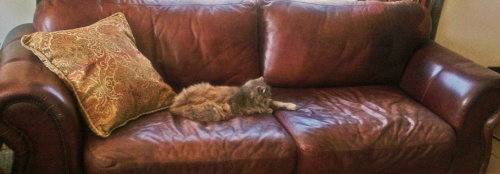Difference between revisions of "Cat fur"
m |
|||
| Line 13: | Line 13: | ||
According to estimates, two million cats and [[Dog leather|dogs]] are processed worldwide this way every year. | According to estimates, two million cats and [[Dog leather|dogs]] are processed worldwide this way every year. | ||
| − | Cat [[fur]] is forbidden to sell in a lot of countries. According to REGULATION (EC) No 1523/2007 and by the German Animal Products Trading Act (TierErzHaVerbG), it is generally prohibited to sell [[Cat fur|cat fur]] and dog fur, as well as products containing such fur in the EU, or from the EU to other destinations. | + | Cat [[fur]] is forbidden to sell in a lot of countries. According to REGULATION (EC) No 1523/2007 and by the German Animal Products Trading Act (TierErzHaVerbG), it is generally prohibited to sell [[Cat fur|cat fur]] and dog fur, as well as products containing such fur in the EU, or from the EU to other destinations. Transporting these across borders for non-business reasons though is permitted. |
| − | + | However, these regulations relate only to the [[fur]] of cats and [[Dog leather|dogs]]. There are no restrictions on sales of [[Smooth leather|hairless leather]] of dogs and cats or animal hair without skin. Teeth, claws or bones are also not subject to any restrictions.There is no explanation for this. | |
The consumption of cat or dog meat is regulated in Germany. This is prohibited in Germany according to § 22 of the Food Hygiene Ordinance. | The consumption of cat or dog meat is regulated in Germany. This is prohibited in Germany according to § 22 of the Food Hygiene Ordinance. | ||
| − | In order to avoid the word "cat", which | + | In order to avoid the word "cat", which sounds unpleasant to the western customer, traders often use names such as "'''Lipi'''", "'''Genotte'''", "'''mountain cat'''", "'''wild cat'''" or just "'''orthopedic leather'''" . Little do they know that usually all these items are made using domestic cats. |
Even for professionals, it is difficult to recognize which [[exotic leather|animal]] a fur is from. Therefore, it cannot be excluded that such furs or leather are processed in Asia and imported into Europe. | Even for professionals, it is difficult to recognize which [[exotic leather|animal]] a fur is from. Therefore, it cannot be excluded that such furs or leather are processed in Asia and imported into Europe. | ||
Revision as of 00:54, 14 December 2016
Cat leather and cat fur mainly comes from East Asia and is used as fur collars on clothing or for stuffed animals. Up until the 1970s, cat skins were sold as rheumatic protection in Europe by pharmacies.
According to estimates, two million cats and dogs are processed worldwide this way every year.
Cat fur is forbidden to sell in a lot of countries. According to REGULATION (EC) No 1523/2007 and by the German Animal Products Trading Act (TierErzHaVerbG), it is generally prohibited to sell cat fur and dog fur, as well as products containing such fur in the EU, or from the EU to other destinations. Transporting these across borders for non-business reasons though is permitted.
However, these regulations relate only to the fur of cats and dogs. There are no restrictions on sales of hairless leather of dogs and cats or animal hair without skin. Teeth, claws or bones are also not subject to any restrictions.There is no explanation for this.
The consumption of cat or dog meat is regulated in Germany. This is prohibited in Germany according to § 22 of the Food Hygiene Ordinance.
In order to avoid the word "cat", which sounds unpleasant to the western customer, traders often use names such as "Lipi", "Genotte", "mountain cat", "wild cat" or just "orthopedic leather" . Little do they know that usually all these items are made using domestic cats.
Even for professionals, it is difficult to recognize which animal a fur is from. Therefore, it cannot be excluded that such furs or leather are processed in Asia and imported into Europe.
Additional information
Video about leather of different animal species
Leather of different animal species - Exotic leather
Other exotic leather
- Alligator leather
- Alpaca fur
- Antelope leather
- Armadillo leather
- Bird leather
- Bull testicles
- Caiman leather
- Camel leather
- Carpincho leather
- Chicken leather
- Crocodile leather
- Dog leather
- Donkey leather
- Elephant leather
- Fish leather: Eel, shark, salmon, moray eel, stingray and many others
- Frog leather - Toad leather
- Giraffe leather
- Hippo Leather
- Horsehide - Horse leather
- Kangaroo leather
- Llama Fur
- Lizard leather
- Ostrich leather
- Pangolin leather
- Peccary leather
- Rumen leather
- Sealskin leather
- Snakeskin
- Turtle skin
- Walrus leather
- Yak leather
- Zebra hide









 a kotori web solution
a kotori web solution